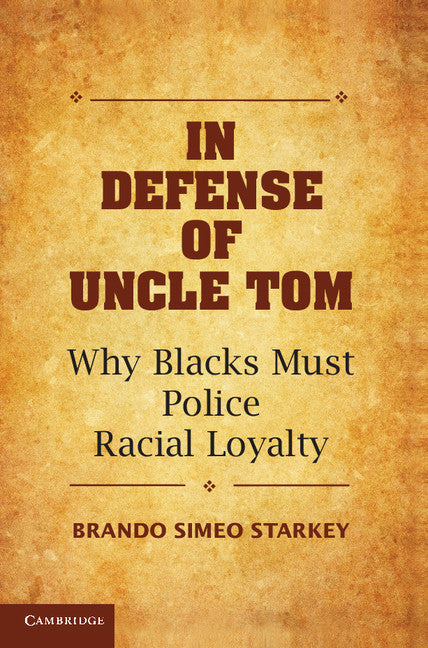Freshly Printed - allow 8 days lead
Couldn't load pickup availability
In Defense of Uncle Tom
Why Blacks Must Police Racial Loyalty
This book shadows the usage of 'Uncle Tom' to understand how social norms associated with the phrase were constructed and enforced.
Brando Simeo Starkey (Author)
9781107070042, Cambridge University Press
Hardback, published 12 January 2015
372 pages
23.1 x 15.5 x 2.5 cm, 0.67 kg
'In a thorough and historically grounded treatment of the subject, Sharkey chronicles the rise and changing significance of the epithet 'Uncle Tom', and insightfully explains its vital social function as punishment for betrayal and servility, and, while noting its many dangers and abuses, persuasively defends the continuing usefulness of this stinging condemnation. Because of its subtle, circumspect, and level-headed treatment of practical principles for group unity, In Defense of Uncle Tom has lessons for any disadvantaged group seeking a full measure of justice.' Tommie Shelby, author of We Who Are Dark: The Philosophical Foundations of Black Solidarity
'Uncle Tom' is the most piercing epithet blacks can hurl at one another. It marks targets as race traitors, and that painful stain is often permanent. Much more than a slur, Uncle Tom is a vital component of a system of social norms in the black community that deters treachery. In this book, Brando Simeo Starkey provocatively argues that blacks must police racial loyalty and that those successfully prosecuted must be punished with the label Uncle Tom. This book shadows Uncle Tom throughout history to understand how these norms were constructed, disseminated, applied, and enforced. Why were Martin Luther King, Jr, Marcus Garvey, Muhammad Ali, Jackie Robinson, Thurgood Marshall and others accused of racial betrayal? In Defense of Uncle Tom answers this and other questions and insists that Uncle Tom is too valuable to discard. Because it deters treachery, this epithet helps build black solidarity, a golden tool in promoting racial progress.
1. Solidarity, social norms, and Uncle Tom
2. Uncle Tom: 1865–1959
3. The unwitting pioneers
4. Uncle Tom: 1960–75
5. No man was safe
6. Uncle Tom today: 1976–present
7. So what about Clarence?
8. The curious case of Uncle Tom
9. What now, Uncle Tom?
Subject Areas: Law & society [LAQ], Jurisprudence & general issues [LA]


